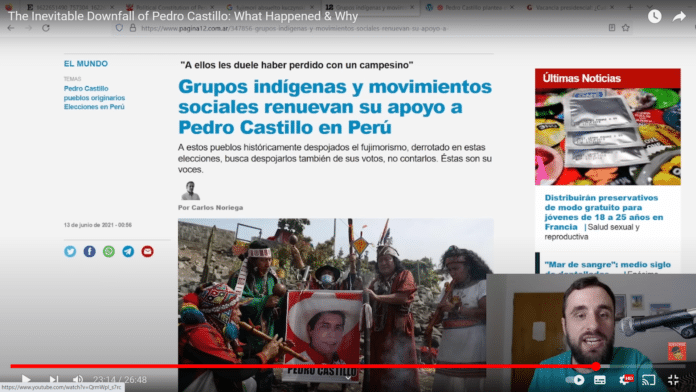A recent US report states the following:
‘Peru is a constitutional, multiparty republic. President Pedro Castillo assumed the presidency in July, succeeding President Francisco Sagasti, after winning the June 6 presidential runoff, in elections that observers characterized as free and fair. Legislative elections took place concurrently to elect the 130-member, single-chamber parliament.
The Peruvian National Police report to the Ministry of Interior and maintain internal security. The Peruvian Armed Forces, reporting to the Ministry of Defense, are responsible for external security in addition to some domestic security responsibilities in designated emergency areas and in exceptional circumstances. Civilian authorities maintained effective control over security forces. There were credible reports that members of security forces committed some abuses.
Significant human rights issues included credible reports of serious government corruption at all levels, including in the judiciary; lack of investigation of and accountability for gender-based violence; and sex and labor trafficking.
The government took steps to investigate and, in some cases, prosecute or otherwise punish public officials accused of abuses and corruption, including high-level officials. Nonetheless, corruption and a perception of impunity remained prevalent and were major public concerns.’
But what is the reality?
We know we cannot trust the USA as they have meddled in South American politics for well over a century and the CIA have made it their primary function to manipulate any country not sympatahetic to their economic and political ideology.
Here though is an explaination of the events that led up to Pedro Castillo, now ex-president of Peru, attempting to dissolve congress on December 7th, the possible reasons for why he did so, and the way the event is being presented by the Western ‘left’. It clearly reveals that the facts and the context are very different than western audiences have received.
The last 20 years:
Pedro Castillo, 2021-2022
A former teacher and farmer, Castillo gained strong support in poor, rural areas of the country to win a divisive election campaign but his approval ratings fell quickly and he faced constant opposition from a fragmented Congress and accusations of “moral incapacity”.
He survived two impeachment votes before finally being voted out on Wednesday in a dramatic day where he had earlier tried to dissolve Congress, sparking allegations of an attempted coup.
Manuel Merino, 2020
A former head of Congress who led impeachment proceedings against his predecessor Martin Vizcarra and lasted less than a week.
He resigned after two deaths during protests against his government sparked an exodus from his cabinet and widespread calls for his removal. Lawmakers had said they would launch impeachment proceedings against him if he did not resign.
Martin Vizcarra, 2018-2020
Lawmakers removed Vizcarra after media reports alleged he had received 2.3 million soles ($640,000) in bribes from two companies that won a public works tender while he was a regional governor years earlier.
Vizcarra, who had long clashed with lawmakers, strongly denied the allegations but was voted out of office after a second impeachment trial in as many months found him “morally incapable” of governing.
US politics, Canada’s multiculturalism, South America’s geopolitical rise—we bring you the stories that matter.Sign up
Pedro Pablo Kuczynski, 2016-2018
Prosecutors investigated Kuczynski for favouring contracts with Brazilian construction firm Odebrecht while he was a minister under former President Alejandro Toledo.
Kuczynski initially denied any ties to Odebrecht, a company at the heart of a political corruption probe that swept the whole region. But he eventually acknowledged his consulting firm advised the builder on project financing. Kuczynski resigned from the presidency in 2018 amid pressure from Congress.
Ollanta Humala, 2011-2016
Humala is facing trial over allegations he received $3m from Odebrecht during the 2011 presidential election campaign.
Prosecutors have requested 20 years in prison. Humala denies the allegations.
Alan Garcia, 1985-1990 and 2006-2011
Garcia died by suicide in April 2019 with a gunshot to the head when Peruvian police arrived to arrest him over allegations he participated in another Odebrecht bribery scheme.
A charismatic political leader who served two terms, Garcia repeatedly denied the allegations of bribery.
Alejandro Toledo, 2001-2006
Toledo is accused of receiving a $20m bribe from Odebrecht during his tenure. He is free on bail in the United States but faces extradition proceedings to Peru.
The former president, who has denied the allegations, spent nearly eight months in a Californian prison.
Alberto Fujimori, 1990-2000
Fujimori is serving a 25-year sentence in prison for human rights abuses, including commanding death squads that massacred civilians in a counterinsurgency campaign during his government.
He was later also found guilty of corruption in a large scandal.
Source accessed: Aljazeera
Join us in helping to bring reality and decency back by SUBSCRIBING to our Youtube channel: https://www.youtube.com/channel/UCQ1Ll1ylCg8U19AhNl-NoTg and SUPPORTING US where you can: Award Winning Independent Citizen Media Needs Your Help. PLEASE SUPPORT US FOR JUST £2 A MONTH https://dorseteye.com/donate/







